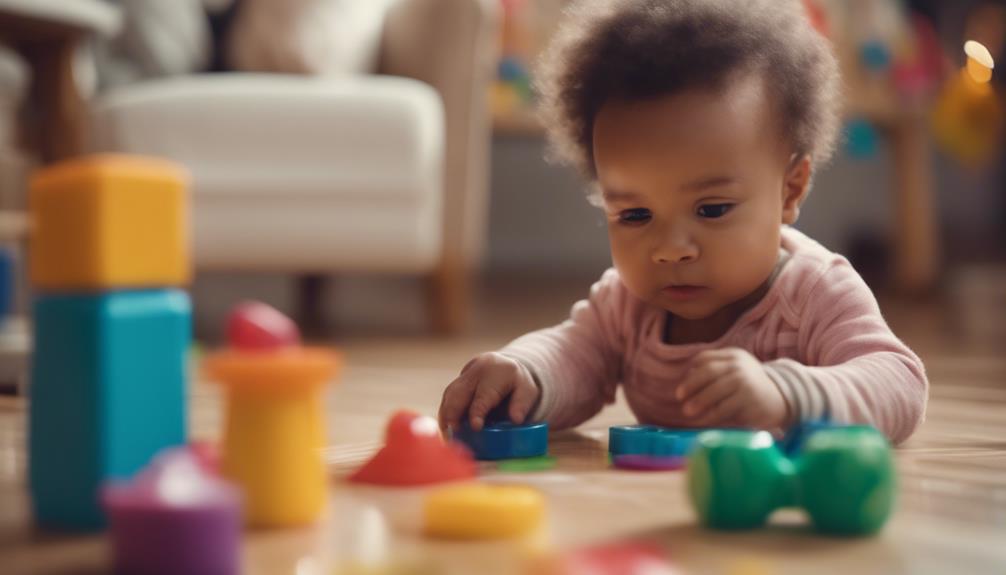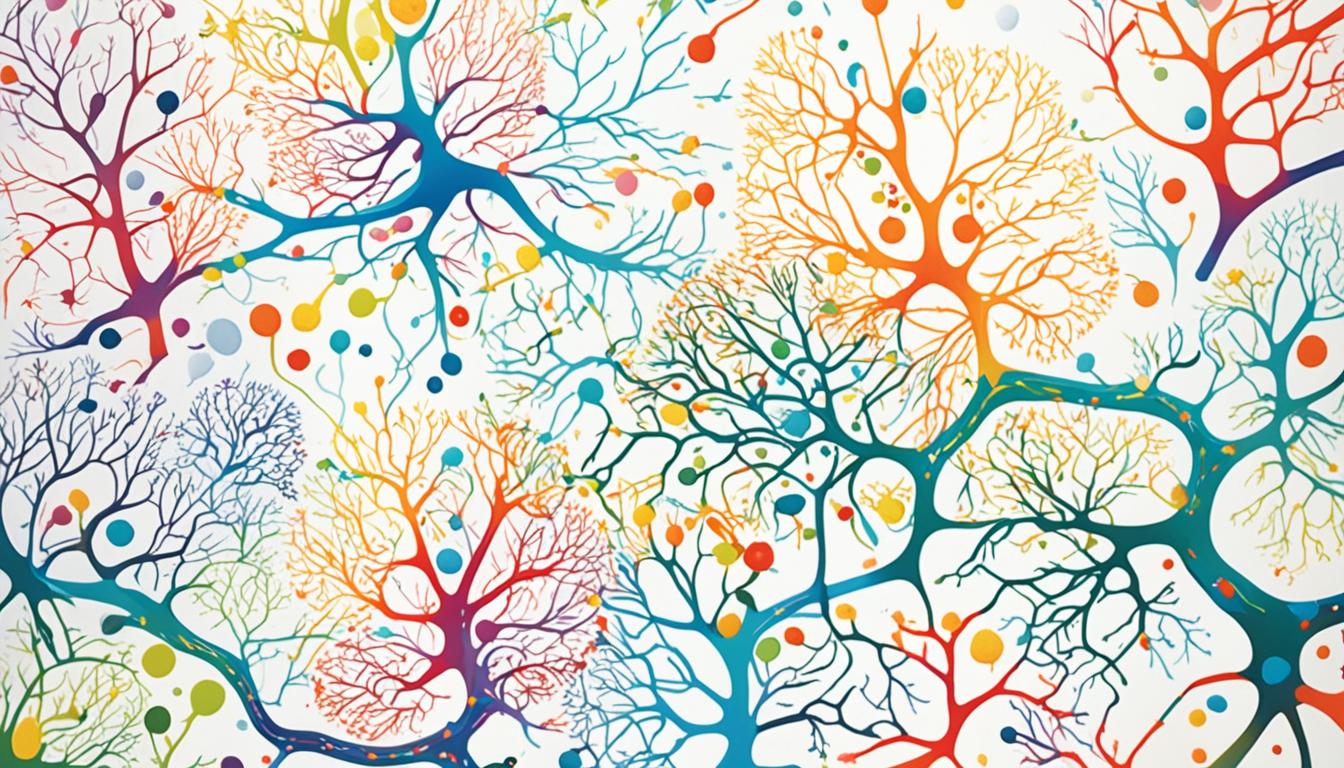Understanding the cognitive development of a child is crucial for their overall growth. By monitoring cognitive milestones in children, parents and caregivers can help nurture their progress and ensure they are meeting key developmental goals. These milestones are specific skills and abilities that most kids achieve by a certain age, like taking their first steps or saying their first words. Meeting these milestones signals that a child’s cognitive development is progressing normally, while delays could indicate a need for extra support and intervention.
For example, let’s meet Emma, a curious and energetic 2-year-old. Emma shows an eagerness to explore her surroundings and communicates using a combination of words and gestures. She is learning to speak in two-word phrases and is beginning to run around independently. These milestones in Emma’s cognitive development are1indicative of her progress in language/communication and movement/physical development.
Tracking cognitive milestones allows parents and caregivers to monitor a child’s progress and identify any areas of concern. By observing and documenting their achievements, parents can gain valuable insights into their child’s cognitive growth and development. Additionally, recognizing milestones aids in early identification of potential delays or issues, leading to timely intervention and support.
Key Takeaways:
- Tracking cognitive milestones in children is crucial for understanding their cognitive development and ensuring that they are progressing as expected.
- Developmental milestones serve as important indicators of a child’s cognitive growth and potential delays.
- Key developmental domains include language/communication, cognitive (learning, thinking, problem-solving), and movement/physical development.
- Tracking each child’s developmental milestones over time provides a better understanding of their development and helps assess if concerns are warranted.
- Early intervention services can address concerns about a child’s cognitive development and provide support to help them reach milestones at an appropriate pace.
Why Cognitive Milestones are Important
Understanding and keeping track of cognitive milestones in children is important for several reasons. Firstly, it provides valuable insights into a child’s overall cognitive development. By monitoring their progress, parents and caregivers can identify if a child is reaching milestones at the expected ages. This can help to ensure that a child’s cognitive skills are developing appropriately2.
Additionally, developmental milestones in the cognitive domain, such as problem-solving and critical thinking skills, lay the foundation for future academic success. Early identification and intervention in case of a delay can also help children receive the necessary support and services to reach their full potential2.
Cognitive Domains of Development
When it comes to cognitive development in children, there are various domains that encompass their learning and thinking abilities. These domains include language/communication, cognitive (learning, thinking, problem-solving), and movement/physical development. Let’s take a closer look at each of these domains:
Language/Communication Domain:
In the language/communication domain, children acquire the skills necessary to express their needs, understand spoken language, and use words to communicate. This domain encompasses milestones such as:
- Development of vocabulary
- Understanding and producing sentences
- Engaging in conversations
Developing language and communication skills is essential for cognitive growth as it enables children to express themselves, understand the world around them, and engage in social interactions.
Cognitive Domain:
The cognitive domain focuses on the cognitive skills related to learning, thinking, and problem-solving. This domain encompasses milestones such as:
- Exploring the environment
- Engaging in pretend play
- Counting and recognizing letters and numbers
Encouraging cognitive development in this domain involves providing opportunities for children to explore, discover, and solve problems. It lays the foundation for critical thinking and creative problem-solving skills.
Movement/Physical Development Domain:
The movement/physical development domain encompasses milestones related to how children use their bodies. This includes milestones such as:
- Walking and running
- Manipulating objects
- Developing fine motor skills
Movement and physical development play a crucial role in cognitive growth as they provide children with the means to explore their environment, interact with objects, and develop coordination and motor skills.
By recognizing and encouraging cognitive development across these domains, parents and caregivers can support children’s overall cognitive growth and ensure they reach important developmental milestones.

Developmental milestones serve as indicators of a child’s growth, representing the cognitive progress they make along their journey. However, it’s important to remember that each child develops at their own pace, and reaching milestones may vary. By providing a nurturing environment and engaging in activities that stimulate cognitive development, parents and caregivers can support children in reaching their full potential.
2 Statistical data source: Link 1
| Milestone | Age Range |
|---|---|
| Recognizing objects | Birth to 3 months |
| Understanding object permanence | 1 year |
| Sorting objects by category | 2 years |
| Attention span of 5 to 15 minutes | 3 years |
| Counting and identifying colors | 4 years |
Cognitive Milestones in Infants (0-12 Months)
In the first year of life, infants experience significant cognitive growth, reaching various cognitive milestones3. These milestones highlight the remarkable development of their cognitive abilities and provide valuable insights into their learning and perception of the world.
During the first few months, infants begin to demonstrate anticipatory behaviors, such as smiling and laughing3. They also show interest in their surroundings by looking towards the direction of sound and imitating adult tongue movements. Through sensory experiences, infants learn about their environment and build connections between their senses and the world around them3.
As infants reach 4 to 8 months of age, they start developing more advanced cognitive skills3. They become capable of swiping or reaching for dangling objects, showcasing their newfound hand-eye coordination. Infants also develop preferences for certain foods, indicating their ability to recognize and respond to different tastes3.
Between 8 to 12 months old, infants continue to achieve cognitive milestones3. They begin to solve problems by moving obstacles to access desired toys, displaying problem-solving abilities3. Infants also respond to their own name and communicate through gestures, showing their growing understanding of language and using nonverbal communication to express their needs3. Additionally, their interest in picture books suggests their engagement with visual stimuli and their emerging understanding of symbols and representations3.
A significant cognitive milestone that develops throughout these stages is object permanence, which infants begin to grasp by the end of the 4-8 months stage3. This milestone denotes their understanding that objects continue to exist even when they are out of sight, laying the groundwork for future cognitive development3.
It is important to note that infants’ perception and interaction with their environment are shaped by their unique abilities, experiences, and developmental levels3. Tracking these cognitive milestones in infants enables parents and caregivers to ensure that their little ones’ cognitive development progresses as expected, setting a strong foundation for future learning and growth.
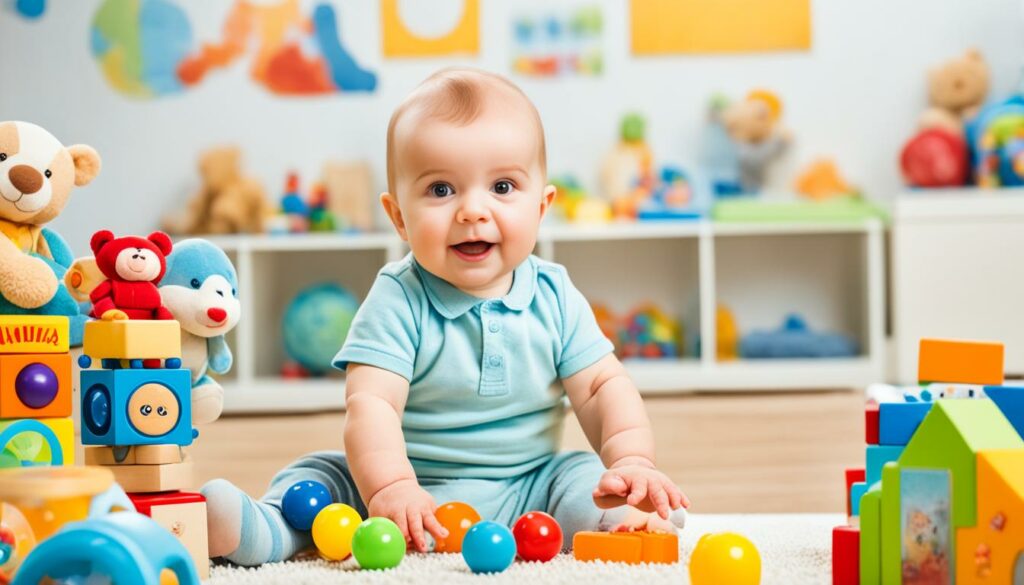
Cognitive Milestones in Toddlers (1-3 Years)
Toddlers between the ages of 1 and 3 years reach significant cognitive milestones. They begin to imitate actions and gestures, manipulate objects, and understand the concept of object permanence at a deeper level.
Toddlers also start to engage in pretend play, imitate adult actions and language, and sort objects into categories. Their language and communication skills continue to develop, with toddlers using words and phrases to express their thoughts and participate in conversations.
According to the statistical data extracted from , it is important to note that different children develop at different rates. Therefore, while these cognitive milestones provide a general framework, parents and caregivers should also consider individual variations in children’s development.
Play plays a crucial role in the cognitive development of toddlers. Through play, children can practice and refine their cognitive skills in a fun and engaging way. They learn problem-solving, decision-making, and critical thinking skills as they engage with toys and interact with their environment.
The concept of object permanence, an important developmental milestone, is also further refined during this stage. Toddlers begin to understand that objects continue to exist even when they are out of sight, which enhances their cognitive abilities.
“Play is not just fun; it is fundamentally important for cognitive, emotional, and social development.”
Early On Michigan
Furthermore, according to , playing is an important way for toddlers to learn and develop. It stimulates their imagination, creativity, and problem-solving skills. Through play, toddlers can explore their surroundings and develop a better understanding of the world around them.
The cognitive milestones achieved during the toddler years lay the foundation for future cognitive development and academic success. By tracking these milestones, parents and caregivers can ensure that their toddlers are progressing in their cognitive abilities.
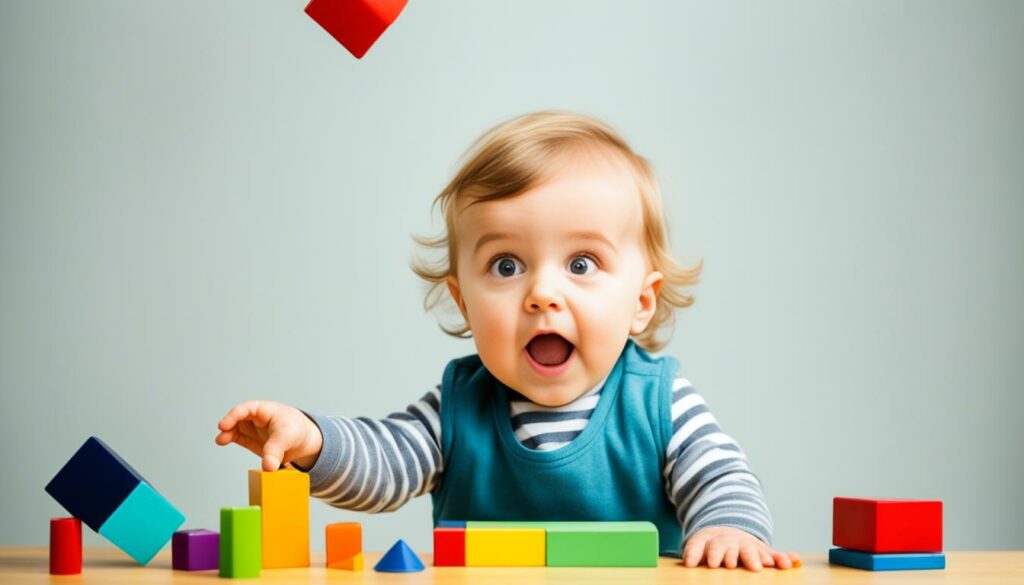
| Cognitive Milestones in Toddlers (1-3 Years) | |
|---|---|
| Recognize objects within a distance of 13 inches | Reference:4 |
| See all the colors within the human visual spectrum | |
| Differentiate between pictures of different numbers of objects | |
| Understand the concept of object permanence | |
| Identify their own reflection in a mirror | |
| Name objects from a picture book | |
| Sort objects into categories (ex. animals, flowers, food, etc.) | |
Recognizing Developmental Milestones in Children
Recognizing developmental milestones is essential for monitoring your child’s development and ensuring they are reaching important milestones at the expected ages. By observing and tracking these milestones, you can gain valuable insights into your child’s growth and identify any potential delays or issues that may require further assessment and intervention.
Developmental milestones act as vital early warning signs for potential developmental delays. For example, at six months, your child should have developed social/emotional skills such as recognizing familiar people and laughing. They should also be displaying cognitive abilities like reaching for a desired toy and taking turns making sounds with you1.
As your child grows, they will continue to achieve new milestones. At nine months, they might exhibit social/emotional traits like shyness or clinginess around strangers, while also demonstrating cognitive capabilities such as smiling or laughing in response to peek-a-boo games1. By 12 months, they may engage in playful activities like pat-a-cake, demonstrate language/communication skills by calling parents by special names, and exhibit cognitive abilities like putting objects in containers1.
At 18 months, your child’s social/emotional development may involve moving away from you but still checking to ensure you are close by. They may also attempt to say three or more words besides “mama” or “dada,” while demonstrating cognitive skills such as imitating chores like sweeping with a broom1.
Continuing to track your child’s milestones, you’ll find that by two years old, they will start actively looking at your face to understand how to react in new situations. Additionally, their language/communication skills may progress to using two-word phrases like “more milk,” and they may exhibit cognitive abilities like playing with multiple toys simultaneously1.
As your child reaches three years old, their social/emotional growth may involve noticing and joining other children in play. Language/communication skills develop further, as they engage in back-and-forth conversations with you. Cognitive milestones at this age involve drawing circles when shown how and accomplishing tasks like independently putting on clothes1.
Remember, recognizing these developmental milestones provides an important foundational understanding of your child’s growth. It can help you identify any potential delays or issues that may require early intervention and support. By addressing these delays early on, you can provide your child with the necessary assistance and services to ensure they reach their full potential. Pediatric offices utilize various screening tools to detect developmental delays, such as the Modified Checklist for Autism Screening in Toddlers (M-CHAT)5. Early detection and intervention are particularly crucial for developmental disorders like autism spectrum disorder, as outcomes are most improved when interventions are implemented early5.
By maintaining a strong partnership with your child’s primary care physician and staying vigilant in recognizing developmental milestones, you play a crucial role in the early identification of any potential delays or issues. This collaboration enables the implementation of effective intervention strategies that support your child’s cognitive development and overall well-being5.
Milestone Checklists and Resources
Tracking and monitoring your child’s cognitive milestones is essential for ensuring their healthy development. Fortunately, there are various resources available to assist parents and caregivers in this process. One invaluable tool is the milestone checklists provided by the Centers for Disease Control and Prevention (CDC). These checklists offer age-specific milestones from birth to five years of age, covering crucial areas of development such as motor skills, sensory skills, communication abilities, and feeding milestones. By referring to these checklists, you can gain a comprehensive understanding of the milestones your child should be reaching at different ages.
The CDC milestone checklists can be easily accessed online or downloaded for offline use. With these checklists, you can track your child’s progress and identify any potential developmental delays or areas for further attention. Whether it’s monitoring their ability to grasp objects, respond to familiar sounds, or recognize similar objects, these checklists provide valuable insights into your child’s cognitive development. Using the CDC’s milestone checklists ensures that you have a structured reference point to assess your child’s milestones, enabling you to celebrate their achievements and address any concerns promptly.
In addition to the checklists, the CDC offers a user-friendly Milestone Tracker app, which allows parents to conveniently track their child’s milestones on the go. This app provides a digital platform for documenting your child’s cognitive progress, making it easy to monitor their milestones and stay informed about their development. The Milestone Tracker app serves as a valuable resource for parents and caregivers, empowering them to actively engage in their child’s cognitive growth.
By utilizing milestone checklists and the Milestone Tracker app, parents and caregivers can identify potential developmental delays early on and take appropriate action. These resources help establish a baseline for your child’s cognitive milestones and enable you to provide the necessary support and intervention. Identifying any delays in reaching cognitive milestones allows for early intervention services, which have shown to have a positive impact on helping children reach their developmental milestones6.
By using the milestone checklists and resources provided by the CDC, you can confidently track your child’s cognitive milestones and ensure their healthy cognitive development. These tools offer invaluable guidance, allowing you to monitor their progress, identify any potential delays, and provide the necessary support for their cognitive growth. Start utilizing the milestone checklists and the Milestone Tracker app today to actively participate in your child’s cognitive development journey.
### Image placement
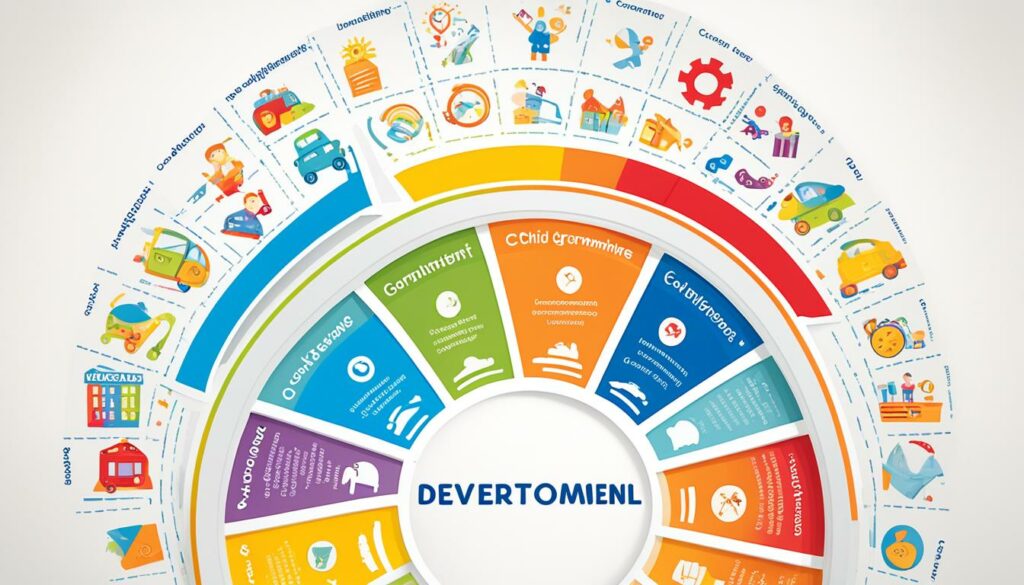
Early Intervention for Cognitive Development Delays
When it comes to addressing cognitive development delays in children, early intervention is key. If a child is not reaching cognitive milestones within the expected time frame, early intervention services can provide the necessary support and assistance to help them catch up and overcome any delays7. Early intervention may involve a range of therapies and interventions that are customized to the specific needs of the child. This can include speech therapy, occupational therapy, and educational interventions8.
By seeking early intervention, parents and caregivers can give their children the best possible chance to overcome any cognitive development delays and reach their full potential. It is important to address these delays as early as possible, as research indicates that early intervention can lead to positive outcomes in various areas of development, including cognitive, social, emotional, and behavioral functioning8. Early intervention services can optimize school readiness, academic performance, and reduce the need for special education services8. By addressing developmental delays early on, children are more likely to achieve favorable outcomes across multiple areas of development8.
Early intervention not only benefits the child but also supports families by providing them with the necessary education, training, and resources to understand and support their child’s needs8. Monitoring a child’s developmental milestones accurately using standardized questionnaires is crucial for identifying any potential delays9. It is important for parents and caregivers to contact their local early intervention program if they have any concerns about their child’s development or milestones. These programs often offer free evaluations to assess a child’s developmental progress9. Through early intervention, children with cognitive development delays can receive the appropriate support and guidance to help them thrive and reach their full potential7.
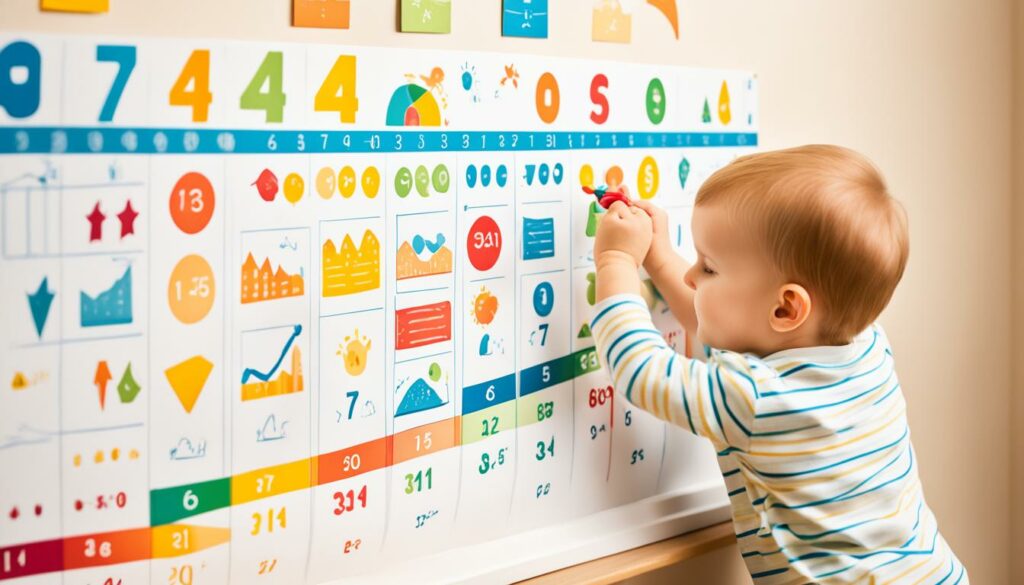
Early Intervention Services for Cognitive Development Delays
Early intervention services focus on assisting babies and toddlers with disabilities or delays in learning key skills necessary for their physical, cognitive, communication, social/emotional, and self-help development. These services, authorized by law through Part C of the Individuals with Disabilities Education Act (IDEA), are available in every state and territory of the United States9. They provide a range of support, including assistive technology, audiology or hearing services, speech and language services, counseling, medical services, nursing services, nutrition services, occupational therapy, physical therapy, and psychological services9. Early intervention is intended for infants and toddlers with developmental delays or disabilities, who can receive services from birth through the third birthday9. For some children, early intervention is essential from birth, particularly those diagnosed at birth with specific conditions, prematurity, low birth weight, illness, or early surgeries9.
Developmental delays can encompass various areas such as cognitive development, physical development, communication development, social/emotional development, and adaptive development9. Monitoring developmental milestones is crucial for identifying potential delays or disabilities9. Each state defines its own criteria for developmental delays, but if parents or caregivers have concerns about their child’s development or milestones, it is recommended to contact the local early intervention program, which often offers free evaluations9. The evaluation process involves a service coordinator who determines a child’s eligibility for early intervention services9. Screening may also occur to identify potential delays or disabilities before a comprehensive evaluation is conducted9. Child Find programs are available in every state to identify infants and toddlers in need of early intervention services due to developmental delays or disabilities9.
The Role of Play in Cognitive Development
Play plays a vital role in promoting cognitive development in children. Through play, children engage in various activities that stimulate their thinking, problem-solving, and decision-making skills. Play allows children to explore their environment, test their ideas, and develop their imagination and creativity. It also provides opportunities for social interaction and language development, further enhancing cognitive growth.
Research has shown that play-based activities have significant cognitive benefits for children. Preschoolers learn best through play, which is crucial for their cognitive development10. Spending time playing with a child not only enhances their cognitive development but also strengthens the parent-child relationship10. Establishing a warm and loving relationship is foundational for a child’s overall learning and development10.
“Play is the highest form of research.” – Albert Einstein
During play, children engage in activities that challenge their cognitive abilities. By the age of 4, children start developing a sense of humor, asking questions about concepts like ‘bigger’ and ‘taller,’ and begin to predict future events10. At 5 years old, children typically improve their concentration and learn to play fair and handle losing gracefully10. However, it’s important to note that preschoolers typically have short attention spans, and activities may need to be varied to avoid restlessness or boredom10.
Play also has a significant impact on brain development. Neuroscience research has shown that play impacts specific areas of the pre-frontal cortex, which are crucial for cognitive function and social competence in mammals11. Additionally, reviews of play-based curricula have indicated higher scores on executive function measures compared to instruction-based schools11. Playful learning in preschools has been associated with improved academic, motivational, and well-being outcomes11. Extended play-based preschool experience has also been shown to benefit children from disadvantaged households in academic and social development11.
Parents and caregivers play a crucial role in supporting cognitive development through play. They can provide age-appropriate toys, engage in interactive play, and encourage imaginative and open-ended play experiences. Balancing screen time and technology is also important. A balanced approach that includes a mix of pretend play, physical activity, social interaction, educational TV shows, and digital play is optimal for children’s learning and development10.
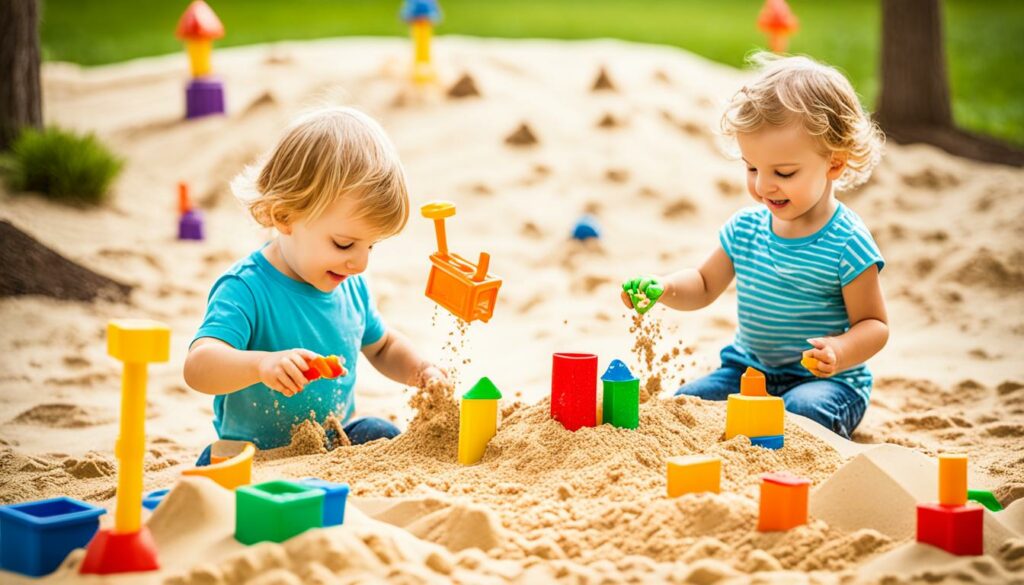
By incorporating play into a child’s daily routine, parents and caregivers can nurture their cognitive growth while providing a fun and engaging environment for learning. The benefits of play extend beyond cognitive development, as it also promotes physical, social, and emotional well-being. So, let’s embrace play as a powerful tool for nurturing children’s overall development.
The Importance of Tracking Cognitive Milestones
Tracking cognitive milestones is essential for understanding a child’s cognitive growth and ensuring that they are reaching important developmental milestones(tracking cognitive milestones). By monitoring and documenting a child’s progress, parents and caregivers can gain insights into their overall cognitive development and identify any potential delays or issues(tracking cognitive milestones). Tracking cognitive milestones provides a basis for early intervention and support, helping children overcome challenges and reach their full potential(importance of monitoring cognitive milestones). It also allows parents and caregivers to celebrate their child’s achievements and provide targeted activities and experiences to foster further cognitive growth(importance of monitoring cognitive milestones).
Understanding a child’s cognitive growth is crucial for their overall development. By tracking cognitive milestones in children, parents and caregivers can effectively foster their growth and ensure that they are reaching important developmental milestones(tracking cognitive milestones, importance of monitoring cognitive milestones). Developmental milestones are skills and abilities that most children achieve by a certain age, such as taking their first steps or saying their first words. Reaching these milestones indicates that a child’s cognitive development is on track, while delays in reaching milestones may suggest a developmental issue that requires additional support and intervention(tracking cognitive milestones1).
Milestones are critical for understanding a child’s development and behavior(tracking cognitive milestones1). They can help explain a child’s behavior. For example, crying when a parent leaves is a typical 12-month milestone signifying healthy development(tracking cognitive milestones1). Milestones are categorized into domains: Language/Communication, Cognitive, and Movement/Physical Development(tracking cognitive milestones1). These milestones encompass various aspects of a child’s development and provide a holistic view of their cognitive growth(tracking cognitive milestones1).
By monitoring each child’s developmental milestones over time, caregivers gain a better understanding of their development and can spot warning signs of potential delays(tracking cognitive milestones1). Not reaching specific milestones by certain ages can be a red flag for developmental concerns(tracking cognitive milestones1). Early intervention might be required if a child fails to meet cognitive milestones in time(tracking cognitive milestones4). Early intervention services can aid children in meeting cognitive milestones(tracking cognitive milestones4). These services can provide the necessary support and assistance to help children overcome any delays and reach their full potential(tracking cognitive milestones4).
Participation in quality early childhood programs has been linked to better education outcomes in adulthood(tracking cognitive milestones12). Early childhood educators can set the foundation for success as children develop many neural pathways from birth through age five(tracking cognitive milestones12). Engagement in activities such as playing with blocks, quoting nursery rhymes, and working on puzzles are essential for promoting cognitive development in preschoolers(tracking cognitive milestones12). Simple cooking activities in the classroom can enhance children’s cognitive skills(tracking cognitive milestones12). Additionally, role-playing activities offer children a safe environment to work through various scenarios and foster cognitive and social development(tracking cognitive milestones12).
Benefits of Tracking Cognitive Milestones:
- Provides insights into a child’s cognitive development(tracking cognitive milestones)
- Early identification and intervention in case of delays(tracking cognitive milestones4)
- Foundation for future academic success(tracking cognitive milestones4)
- Celebration of achievements and targeted activities for further growth(tracking cognitive milestones)
- Ability to spot warning signs of potential delays and seek appropriate support(tracking cognitive milestones1)
- Enhancement of cognitive skills and overall development(tracking cognitive milestones4, tracking cognitive milestones12)
Methods for Tracking Cognitive Milestones:
- Monitoring developmental milestones using checklists and resources(tracking cognitive milestones1)
- Observing and documenting a child’s progress through regular assessments(tracking cognitive milestones)
- Working closely with healthcare professionals and early childhood educators(tracking cognitive milestones12)
- Utilizing technology and digital platforms for milestone tracking(tracking cognitive milestones)
- Seeking guidance from experts if milestone delays are noticed(tracking cognitive milestones4)
Tracking cognitive milestones is an essential tool for parents and caregivers to ensure a child’s cognitive development is progressing as expected(importance of monitoring cognitive milestones). By monitoring and addressing any potential delays or issues, parents can support their child’s cognitive growth and provide them with the necessary resources for success(importance of monitoring cognitive milestones).
![]()
Conclusion
Tracking cognitive milestones in children is crucial for understanding their cognitive development and ensuring that they are progressing as expected. By observing and monitoring developmental milestones, parents and caregivers can identify any potential delays or issues and seek appropriate support and intervention. Every child develops at their own pace, but tracking milestones provides valuable insights into a child’s cognitive growth. Research has shown that cognitive development in school-age children is a significant area of investigation, with a consensus emerging about the conclusions drawn from research to date and the directions new research and theory should take13. It is important to recognize that children do not develop in stages as traditionally defined; their behavior changes gradually across different domains at varying rates13. Major qualitative changes in behavior occur, indicating reorganization and the development of new abilities in children13. Large-scale reorganizations in cognitive development feature major qualitative changes happening rapidly across multiple domains, known as levels13. Between the ages of 4 and 18, there seem to be four major levels of cognitive development, beginning around age 4 with the ability to handle simple relations of representations13.
FAQ
What are cognitive milestones in children?
Why are cognitive milestones important?
What are the cognitive domains of development?
What are the cognitive milestones in infants (0-12 months)?
What are the cognitive milestones in toddlers (1-3 years)?
How can I recognize developmental milestones in children?
What milestone checklists and resources are available?
What is early intervention for cognitive development delays?
What role does play have in cognitive development?
Why is tracking cognitive milestones important?
Source Links
- https://www.cdc.gov/ncbddd/watchmetraining/module2.html
- https://www.verywellmind.com/cognitive-developmental-milestones-2795109
- https://aussiechildcarenetwork.com.au/articles/child-development/cognitive-development-for-infants-0-12-months
- https://aboutplaysc.com/cognitive-development-milestones-for-children-0-3-years/
- https://www.ncbi.nlm.nih.gov/books/NBK557518/
- https://pathways.org/all-ages/checklists/
- https://my.clevelandclinic.org/health/diseases/14814-developmental-delay-in-children
- https://www.chnola.org/news-blog/2023/march/importance-of-early-intervention-as-it-relates-t/
- https://www.parentcenterhub.org/ei-overview/
- https://raisingchildren.net.au/preschoolers/play-learning/play-preschooler-development/thinking-play-preschoolers
- https://cms.learningthroughplay.com/media/esriqz2x/role-of-play-in-childrens-development-review_web.pdf
- https://post.edu/blog/importance-of-cognitive-development-early-childhood/
- https://www.ncbi.nlm.nih.gov/books/NBK216774/



